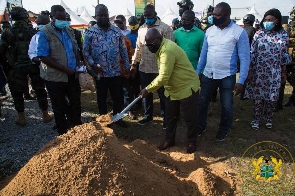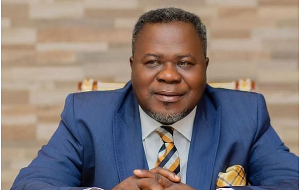General News of Thursday, 5 September 2002
Source: .
British High Commission Awards 20 Scholarships
The British High Commission recently held a reception to bid bon voyage to 20 Ghanaian Chevening Scholars who are leaving to undertake postgraduate studies in the United Kingdom. The scholars all depart in the course of this month to undertake studies in subjects ranging from design to e-commerce. All are fully funded by the British High Commission.
Speaking at the reception the British High Commissioner, Dr. Rod Pullen, said, "[these scholars] have the potential to play an important role in the continuing social, economic and political development of Ghana, and to make a real contribution in the years to come. They should be an important element of Ghana's future... They are people of whom Ghana can be rightly proud."
The total cost of the Chevening scheme in Ghana for the academic year 2002-2003 is approximately 300,000 pounds sterling (?3.75 billion).
The aim of the British Chevening Scholarship scheme is to bring to the UK present and future leaders, decision-makers and opinion formers. It is named after 'Chevening House' - the official country residence of the British Foreign Secretary. Preference is given to candidates already established in a career, with proven academic skills, and with the prospect of becoming leaders in their chosen fields. Scholars should also be committed to return to their country and contribute to the socio-economic development of it through implementing the new skills and knowledge acquired in the UK.
Most scholarships are for one year Master's courses, but awards may also be given for shorter vocational courses lasting three and six months. Since its inception in 1983 as the Foreign and Commonwealth Office Scholarships and Awards Scheme, the Chevening programme has provided more than 40,000 scholarships to students in over 150 countries. In Ghana some 125 scholarships have been awarded.
Selection of candidates is carried out by the British High Commission in consultation with the British Council Director in Accra. The application process for awards begins in October with advertisements in the local press for applications from suitably qualified candidates. Interviews of short-listed candidates take place in the following January for courses which start in the next academic year. -0-
BUSINESSMAIL
1) PMMC discovers semi-precious minerals
The Precious Mineral Marketing Company (PMMC) has discovered vast quantities of two semi-precious minerals, serpentine and jasper, in the Volta and Eastern regions.
The company is at the moment negotiating with a Swedish company to carry out exploration to establish the quantity.
The two minerals, when refined and processed into carvings and decorative ornaments, have huge commercial value in places such as Arizona in the United States, which is one of the large markets in the world.
Mr Peter Boachie, Managing Director of PMMC, said this in an interview after he presented a cheque for 300 million cedis to the government as dividend for the year ending 2001 in Accra yesterday.
Mr Kwadwo Adjei-Darko, Minister of Mines, received the cheque on behalf of the government.
Mr Boachie mentioned some of the areas where the company had made the discovery as Anum and Kwamekrom, all in the Volta Region and said the exploration of the minerals forms part of the company's effort to expand their business and generate more foreign exchange.
It would also generate employment in the rural areas.
Mr Boachie said other areas of prospect include forming partnership with especially, private foreign companies to set up a factory to refine gold and polish diamonds for export.
He said PMMC needs private partnership to be able to manufacture jewellery in Ghana because the company does not have the technology.
PMMC has so far contacted three foreign companies, which were rejected by the Environmental Protection Agency (EPA) because their method of using chlorine was not environmentally friendly. Electrolysis would have been preferred.
Mr Boachie said the major problem facing the company is the unpredictable world market prices of precious stones, which dips at any given time.
He said small-scale miners, who are the source of their raw materials need larger concessions to enable them to produce large quantities of gold and diamonds for sale to the company.
The PMMC has therefore contacted the Minerals Commission to allocate more land to the small-scale miners.
Mr Boachie said PMMC sometimes has to purchase the minerals from 'galamsey' miners in order to prevent smuggling into neighbouring countries.
Mr Adjei-Darko said even though the company has improved on last year's dividend, which was 200 million cedis, there is the need to do more.
He said with regard to foreign exchange contribution to the nation, PMMC recorded 29.5 million dollars in 1999 but declined to 28.9 million dollars in 2000.
The figure improved to 31.7 million dollars in 2001 and stood at 17.2 million dollars as at July this year.
Mr Adjei-Darko said the latest figure indicates that the company would earn more than it did in previous years and urged them to improve on their activities such as forming subsidiary companies to allow for local and foreign private sector investments in their operations.












